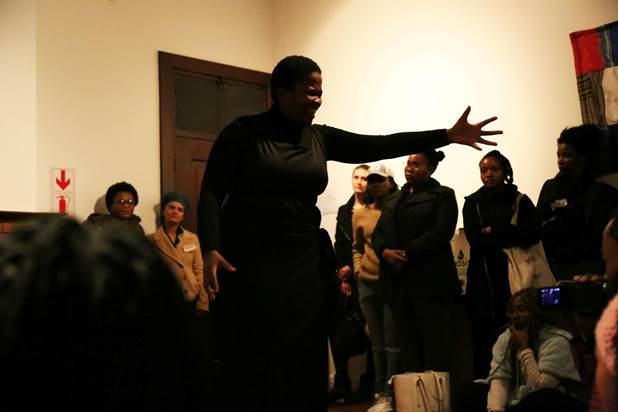
African Feminisms (Afems) Conference 2018:
‘The Mute Always Speak’: (Re) imagining and re-imaging feminist futures
27-29 September 2018
Hosted by Rhodes University Department of Literary Studies in English and Department of Fine Arts
Keynote Speakers: Dr Nthabiseng Motsemme, Dr Siphokazi Magadla, Prof Gabeba Baderoon
In her text, ‘The Mute Always Speak: On Women’s Silences at the Truth and Reconciliation Commission’, Nthabiseng Motsemme discusses new understandings of speech acts, not just the orality which dominates discourses, but a range of performances that will make us understand “South African women’s subjectivities and forms of agency”. In particular, she contemplates how silence has been employed for a range of uses against and under apartheid:
Overall, what the article demonstrates is that when we reject dominant western oppositional hierarchies of silence and speech, and instead adopt frameworks where words, silence, dreams, gestures, tears all exist interdependently and within the same interpretive field, we find that the mute always speak (Motsemme, 2004).
The idea that the mute always speak remains revolutionary. It not only fundamentally undermines the idea that people are voiceless, and like Gayatri Spivak reckons, the problem is rather discourse and whether they can ever have their voices heard unmediated, but that refusing certain speech acts draws attention to those modes and mechanisms of speaking, language and hearing. The refusal to speak tells us that speech acts demand certain conditions, while conditions can also result in the utterable – when horrors, pleasures, life and feelings exceed the limits of the spoken or written word. In her poignant article, ‘Colonialism, Dysfunction and Disjuncture: Sarah Baartman's Resistance (Remix)’ (2003), Yvette Abrahams sees in the sighs and willfulness of Sarah Baartman, and the testimonies of others, a woman who, alone in London with no possibility of return home, still resists attempts at her dehumanization. We have a poetic portrait of Baartman as a woman as Abrahams grafts her personality from the silences, gestures, tears and dreams deferred. Abrahams echoes what Motsemme (2004) says is “the invisible but agentic work of the imagination to reconfigure our social worlds”. Motsemme (2004) argues that the space of imagination-as-generator allows for the “invention of the self [that] can go beyond the limits of available oppressive representations”.
Using Motsemme’s standpoint, Afems 2018 will be a multi-disciplinary platform to hear historical and contemporary mutes speak, questioning language, speech acts, discourse, narratives, contexts, bodies, imaginations and creativities that allow us to hear.
- Textured narratives
- The site of the everyday
- Conceptual tools and methodologies in rethinking African women’s agencies
- The role of the imagination
- Creativities
- Testimony
- Affectivities, body, language
- Speech acts
- Where does it still hurt?
- Economies/economics
- Women and the sciences
- Women and the law
- Women and equality movements
- Women’s health
- Sexualities, (dis)abilities and identities
This conference aims to bring together a range of local and international African feminist scholars in the Sciences, Social Sciences, Economics, Law and Humanities disciplines in a three-day conference (27-29 September 2018). Registration fee for all participants and attendees is R250. Participants can present up to 20 minute papers or creative engagements at Afems 2018. Afems will again feature an array of creativities, including an Art on our Mind public dialogue focusing on the challenges and possibilities for South African women-of-colour visual arts curators.
Conference Abstract Submission:
Registration Fee: R250
Deadline for all abstracts: 30 April 2018 by 6pm (RSA time/SAST)
Please send abstracts to: afrifems17@gmail.com
Confirmation of accepted abstracts: 31 May 2018
For further details on Afems, please see the following website: https://afems2018.wixsite.com/afemsconference/afems-2018